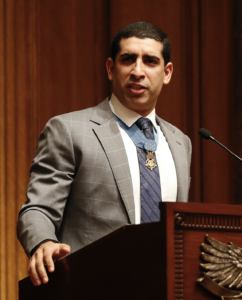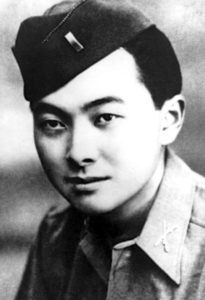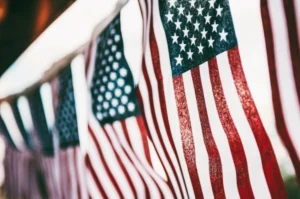23 Americans were awarded the Medal of Honor for their courageous conduct during the 82 days of fighting in The Battle of Okinawa starting on April 1, 1945. This “typhoon of steel” was the final island battle before an anticipated invasion of mainland Japan.
On April 1, 1945, more than 60,000 soldiers and US Marines of the US Tenth Army mounted the largest amphibious assault ever performed in the Pacific Theater of World War II. The attack on Okinawa involved 1,500 ships and over 500,000 men. The landing forces were told to expect an 80% casualty rate. Unlike previous landings, US forces effected a quiet landing with no initial resistance. The quiet did not last long. As the Tenth Army pushed inland fierce fighting began on Okinawa’s southern end. The next 82 days were a land, sea, and air battle of terrible cost.
US Marines triumphed over Imperial Japanese forces by April 18 in the north of Okinawa, but fighting continued in the south. The Japanese centered their defensive line on Shuri Castle, a formidable structure which was surrounded by defensible ridges. The castle did not fall until May 29, the structure had been reduced to ruins before capture.
On April 6, 1945 a wave of 355 Imperial Japanese army and navy kamikaze aircraft attacked the Allied ships aiding the invasion. These attacks cost 26 ships were sunk and another 164 damaged during the battle. The battle raged on until June 22, 1945. The Imperial Japanese forces fought tenaciously, and over 110,000 Japanese soldiers lost their lives before the American victory. Conquering Okinawa caused more than 49,000 American casualties, including about 12,000 deaths.
Beauford T. Anderson

Rank at Time of Action: Technical Sergeant
Service: US Army
Birthday: July 6, 1922
Birthplace: Eagle, Wisconsin
Unit: 1st Battalion, 381st Infantry, 96th Infantry Division
Date of Action: April 13, 1945
Awarded Medal of Honor: June 14, 1946
Medal of Honor Citation: He displayed conspicuous gallantry and intrepidity above and beyond the call of duty. When a powerfully conducted predawn Japanese counterattack struck his unit’s flank, he ordered his men to take cover in an old tomb, and then, armed only with a carbine, faced the onslaught alone. After emptying 1 magazine at pointblank range into the screaming attackers, he seized an enemy mortar dud and threw it back among the charging Japs, killing several as it burst. Securing a box of mortar shells, he extracted the safety pins, banged the bases upon a rock to arm them and proceeded alternately to hurl shells and fire his piece among the fanatical foe, finally forcing them to withdraw. Despite the protests of his comrades, and bleeding profusely from a severe shrapnel wound, he made his way to his company commander to report the action. T/Sgt. Anderson’s intrepid conduct in the face of overwhelming odds accounted for 25 enemy killed and several machineguns and knee mortars destroyed, thus single-handedly removing a serious threat to the company’s flank.
Richard Bush

Rank at Time of Action: Corporal
Service: US Marine Corps Reserve
Birthday: December 23, 1923
Birthplace: Glasgow, Kentucky
Unit: 1st Battalion, 4th Marines, 6th Marine Division
Date of Action: April 16, 1945
Awarded Medal of Honor: October 5, 1945
Medal of Honor Citation: For conspicuous gallantry and intrepidity at the risk of his life above and beyond the call of duty as a squad leader serving with the 1st Battalion, 4th Marines, 6th Marine Division, in action against enemy Japanese forces, during the final assault against Mount Yaetake on Okinawa, Ryukyu Islands, 16 April 1945. Rallying his men forward with indomitable determination, Cpl. Bush boldly defied the slashing fury of concentrated Japanese artillery fire pouring down from the gun-studded mountain fortress to lead his squad up the face of the rocky precipice, sweep over the ridge, and drive the defending troops from their deeply entrenched position. With his unit, the first to break through to the inner defense of Mount Yaetake, he fought relentlessly in the forefront of the action until seriously wounded and evacuated with others under protecting rocks. Although prostrate under medical treatment when a Japanese hand grenade landed in the midst of the group, Cpl. Bush, alert and courageous in extremity as in battle, unhesitatingly pulled the deadly missile to himself and absorbed the shattering violence of the exploding charge in his body, thereby saving his fellow marines from severe injury or death despite the certain peril to his own life. By his valiant leadership and aggressive tactics in the face of savage opposition, Cpl. Bush contributed materially to the success of the sustained drive toward the conquest of this fiercely defended outpost of the Japanese Empire. His constant concern for the welfare of his men, his resolute spirit of self-sacrifice, and his unwavering devotion to duty throughout the bitter conflict enhance and sustain the highest traditions of the U.S. Naval Service.
Robert E. Bush

Rank at Time of Action: Hospital Apprentice First Class
Service: U.S. Naval Reserve
Birthday: October 4, 1926
Birthplace: Tacoma, Washington
Unit: 2nd Battalion, 5th Marines, 1st Marine Division
Date of Action: May 2, 1945
Awarded Medal of Honor: October 5, 1945
Medal of Honor Citation: For conspicuous gallantry and intrepidity at the risk of his life above and beyond the call of duty while serving as Medical Corpsman with a rifle company, in action against enemy Japanese forces on Okinawa Jima, Ryukyu Islands, 2 May 1945. Fearlessly braving the fury of artillery, mortar, and machinegun fire from strongly entrenched hostile positions, Bush constantly and unhesitatingly moved from 1 casualty to another to attend the wounded falling under the enemy’s murderous barrages. As the attack passed over a ridge top, Bush was advancing to administer blood plasma to a marine officer Iying wounded on the skyline when the Japanese launched a savage counterattack. In this perilously exposed position, he resolutely maintained the flow of life-giving plasma. With the bottle held high in 1 hand, Bush drew his pistol with the other and fired into the enemy’s ranks until his ammunition was expended. Quickly seizing a discarded carbine, he trained his fire on the Japanese charging pointblank over the hill, accounting for 6 of the enemy despite his own serious wounds and the loss of 1 eye suffered during his desperate battle in defense of the helpless man. With the hostile force finally routed, he calmly disregarded his own critical condition to complete his mission, valiantly refusing medical treatment for himself until his officer patient had been evacuated, and collapsing only after attempting to walk to the battle aid station. His daring initiative, great personal valor, and heroic spirit of self-sacrifice in service of others reflect great credit upon Bush and enhance the finest traditions of the U.S. Naval Service.
Henry A. Courtney Jr.

Rank at Time of Action: Major
Service: U.S. Marine Corps Reserve
Birthday: January 6, 1916
Birthplace: Duluth, Minnesota
Unit: 2nd Battalion, 22nd Marines, 6th Marine Division
Date of Action: May 14 & 15, 1945
Awarded Medal of Honor: December 30, 1947
Medal of Honor Citation: For conspicuous gallantry and intrepidity at the risk of his life above and beyond the call of duty as Executive Officer of the 2d Battalion, 22d Marines, 6th Marine Division, in action against enemy Japanese forces on Okinawa Shima in the Ryukyu Islands, 14 and 15 May 1945. Ordered to hold for the night in static defense behind Sugar Loaf Hill after leading the forward elements of his command in a prolonged fire fight, Maj. Courtney weighed the effect of a hostile night counterattack against the tactical value of an immediate marine assault, resolved to initiate the assault, and promptly obtained permission to advance and seize the forward slope of the hill. Quickly explaining the situation to his small remaining force, he declared his personal intention of moving forward and then proceeded on his way, boldly blasting nearby cave positions and neutralizing enemy guns as he went. Inspired by his courage, every man followed without hesitation, and together the intrepid marines braved a terrific concentration of Japanese gunfire to skirt the hill on the right and reach the reverse slope. Temporarily halting, Maj. Courtney sent guides to the rear for more ammunition and possible replacements. Subsequently reinforced by 26 men and an LVT load of grenades, he determined to storm the crest of the hill and crush any planned counterattack before it could gain sufficient momentum to effect a breakthrough. Leading his men by example rather than by command, he pushed ahead with unrelenting aggressiveness, hurling grenades into cave openings on the slope with devastating effect. Upon reaching the crest and observing large numbers of Japanese forming for action less than 100 yards away, he instantly attacked, waged a furious battle and succeeded in killing many of the enemy and in forcing the remainder to take cover in the caves. Determined to hold, he ordered his men to dig in and, coolly disregarding the continuous hail of flying enemy shrapnel to rally his weary troops, tirelessly aided casualties and assigned his men to more advantageous positions. Although instantly killed by a hostile mortar burst while moving among his men, Maj. Courtney, by his astute military acumen, indomitable leadership and decisive action in the face of overwhelming odds, had contributed essentially to the success of the Okinawa campaign. His great personal valor throughout sustained and enhanced the highest traditions of the U.S. Naval Service. He gallantly gave his life for his country.
Clarence B. Craft

Rank at Time of Action: Private First Class
Service: U.S. Army
Birthday: September 23, 1921
Birthplace: San Bernardino, California
Unit: 2nd Battalion, 382nd Infantry, 96th Infantry Division
Date of Action: May 31, 1945
Awarded Medal of Honor: October 12, 1945
Medal of Honor Citation: He was a rifleman when his platoon spearheaded an attack on Hen Hill, the tactical position on which the entire Naha-Shuri-Yonaburu line of Japanese defense on Okinawa, Ryukyu Islands, was hinged. For 12 days our forces had been stalled, and repeated, heavy assaults by 1 battalion and then another had been thrown back by the enemy with serious casualties. With 5 comrades, Pfc. Craft was dispatched in advance of Company G to feel out the enemy resistance. The group had proceeded only a short distance up the slope when rifle and machinegun fire, coupled with a terrific barrage of grenades, wounded 3 and pinned down the others. Against odds that appeared suicidal, Pfc. Craft launched a remarkable 1-man attack. He stood up in full view of the enemy and began shooting with deadly marksmanship wherever he saw a hostile movement. He steadily advanced up the hill, killing Japanese soldiers with rapid fire, driving others to cover in their strongly disposed trenches, unhesitatingly facing alone the strength that had previously beaten back attacks in battalion strength. He reached the crest of the hill, where he stood silhouetted against the sky while quickly throwing grenades at extremely short range into the enemy positions. His extraordinary assault lifted the pressure from his company for the moment, allowing members of his platoon to comply with his motions to advance and pass him more grenades. With a chain of his comrades supplying him while he stood atop the hill, he furiously hurled a total of 2 cases of grenades into a main trench and other positions on the reverse slope of Hen Hill, meanwhile directing the aim of his fellow soldiers who threw grenades from the slope below him. He left his position, where grenades from both sides were passing over his head and bursting on either slope, to attack the main enemy trench as confusion and panic seized the defenders. Straddling the excavation, he pumped rifle fire into the Japanese at pointblank range, killing many and causing the others to flee down the trench. Pursuing them, he came upon a heavy machinegun which was still creating havoc in the American ranks. With rifle fire and a grenade he wiped out this position. By this time the Japanese were in complete rout and American forces were swarming over the hill. Pfc. Craft continued down the central trench to the mouth of a cave where many of the enemy had taken cover. A satchel charge was brought to him, and he tossed it into the cave. It failed to explode. With great daring, the intrepid fighter retrieved the charge from the cave, relighted the fuse and threw it back, sealing up the Japs in a tomb. In the local action, against tremendously superior forces heavily armed with rifles, machineguns, mortars, and grenades, Pfc. Craft killed at least 25 of the enemy; but his contribution to the campaign on Okinawa was of much more far-reaching consequence for Hen Hill was the key to the entire defense line, which rapidly crumbled after his utterly fearless and heroic attack.
James L. Day

Rank at Time of Action: Corporal
Service: U.S. Marine Corps
Birthday: September 23, 1921
Birthplace: San Bernardino, California
Unit: 2nd Battalion, 22nd Marines, 6th Marine Division
Date of Action: May 14 – 17, 1945
Awarded Medal of Honor: January 20, 1988
Medal of Honor Citation: For conspicuous gallantry and intrepidity at the risk of his life above and beyond the call of duty as a squad leader serving with the Second Battalion, Twenty-Second Marines, Sixth Marine Division, in sustained combat operations against Japanese forces on Okinawa, Ryukya Islands from 14 to 17 May 1945. On the first day, Corporal Day rallied his squad and the remnants of another unit and led them to a critical position forward of the front lines of Sugar Loaf Hill. Soon thereafter, they came under an intense mortar and artillery barrage that was quickly followed by a ferocious ground attack by some forty Japanese soldiers. Despite the loss of one-half of his men, Corporal Day remained at the forefront, shouting encouragement, hurling hand grenades, and directing deadly fire, thereby repelling the determined enemy. Reinforced by six men, he led his squad in repelling three fierce night attacks but suffered five additional Marines killed and one wounded, whom he assisted to safety. Upon hearing nearby calls for corpsman assistance, Corporal Day braved heavy enemy fire to escort four seriously wounded Marines, one at a time, to safety. Corporal Day then manned a light machine gun, assisted by a wounded Marine, and halted another night attack. In the ferocious action, his machine gun was destroyed, and he suffered multiple white phosphorous and fragmentation wounds. He reorganized his defensive position in time to halt a fifth enemy attack with devastating small arms fire. On three separated occasions, Japanese soldiers closed to within a few feet of his foxhole, but were killed by Corporal Day. During the second day, the enemy conducted numerous unsuccessful swarming attacks against his exposed position. When the attacks momentarily subsided, over 70 enemy dead were counted around his position. On the third day, a wounded and exhausted Corporal Day repulsed the enemy’s final attack, killing a dozen enemy soldiers at close range. Having yielded no ground and with more than 100 enemy dead around his position, Corporal Day preserved the lives of his fellow Marines and made a significant contribution to the success of the Okinawa campaign. By his extraordinary heroism, repeated acts of valor, and quintessential battlefield leadership, Corporal Day inspired the efforts of his outnumbered Marines to defeat a much larger enemy force, reflecting great credit upon himself and upholding the highest traditions of the Marine Corps and the United States Naval Service.
Desmond T. Doss

Rank at Time of Action: Private First Class
Service: U.S. Army
Birthday: February 7, 1919
Birthplace: Lynchburg, Virginia
Unit: 307th Infantry, Medical Detachment, 6th Marine Division, 77th Infantry Division
Date of Action: April 29 – May 21, 1945
Awarded Medal of Honor: October 12, 1945
Medal of Honor Citation: He was a company aid man when the 1st Battalion assaulted a jagged escarpment 400 feet high. As our troops gained the summit, a heavy concentration of artillery, mortar and machinegun fire crashed into them, inflicting approximately 75 casualties and driving the others back. Pfc. Doss refused to seek cover and remained in the fire-swept area with the many stricken, carrying them 1 by 1 to the edge of the escarpment and there lowering them on a rope-supported litter down the face of a cliff to friendly hands. On 2 May, he exposed himself to heavy rifle and mortar fire in rescuing a wounded man 200 yards forward of the lines on the same escarpment; and 2 days later he treated 4 men who had been cut down while assaulting a strongly defended cave, advancing through a shower of grenades to within 8 yards of enemy forces in a cave’s mouth, where he dressed his comrades’ wounds before making 4 separate trips under fire to evacuate them to safety. On 5 May, he unhesitatingly braved enemy shelling and small arms fire to assist an artillery officer. He applied bandages, moved his patient to a spot that offered protection from small arms fire and, while artillery and mortar shells fell close by, painstakingly administered plasma. Later that day, when an American was severely wounded by fire from a cave, Pfc. Doss crawled to him where he had fallen 25 feet from the enemy position, rendered aid, and carried him 100 yards to safety while continually exposed to enemy fire. On 21 May, in a night attack on high ground near Shuri, he remained in exposed territory while the rest of his company took cover, fearlessly risking the chance that he would be mistaken for an infiltrating Japanese and giving aid to the injured until he was himself seriously wounded in the legs by the explosion of a grenade. Rather than call another aid man from cover, he cared for his own injuries and waited 5 hours before litter bearers reached him and started carrying him to cover. The trio was caught in an enemy tank attack and Pfc. Doss, seeing a more critically wounded man nearby, crawled off the litter; and directed the bearers to give their first attention to the other man. Awaiting the litter bearers’ return, he was again struck, this time suffering a compound fracture of 1 arm. With magnificent fortitude he bound a rifle stock to his shattered arm as a splint and then crawled 300 yards over rough terrain to the aid station. Through his outstanding bravery and unflinching determination in the face of desperately dangerous conditions Pfc. Doss saved the lives of many soldiers. His name became a symbol throughout the 77th Infantry Division for outstanding gallantry far above and beyond the call of duty.
John P. Fardy

Rank at Time of Action: Corporal
Service: U.S. Marine Corps
Birthday: August 15, 1922
Birthplace: Chicago, Illinois
Unit: 1st Battalion, 1st Marines, 1st Marine Division
Date of Action: May 7, 1945
Awarded Medal of Honor: September 15, 1946
Medal of Honor Citation: For conspicuous gallantry and intrepidity at the risk of his life above and beyond the call of duty as a squad leader, serving with Company C, 1st Battalion, 1st Marines, 1st Marine Division, in action against enemy Japanese forces on Okinawa Shima in the Ryukyu Islands, 7 May 1945. When his squad was suddenly assailed by extremely heavy small arms fire from the front during a determined advance against strongly fortified, fiercely defended Japanese positions, Cpl. Fardy temporarily deployed his men along a nearby drainage ditch. Shortly thereafter, an enemy grenade fell among the marines in the ditch. Instantly throwing himself upon the deadly missile, Cpl. Fardy absorbed the exploding blast in his own body, thereby protecting his comrades from certain and perhaps fatal injuries. Concerned solely for the welfare of his men, he willingly relinquished his own hope of survival that his fellow marines might live to carry on the fight against a fanatic enemy. A stouthearted leader and indomitable fighter, Cpl. Fardy, by his prompt decision and resolute spirit of self-sacrifice in the face of certain death, had rendered valiant service, and his conduct throughout reflects the highest credit upon himself and the U.S. Naval Service. He gallantly gave his life for his country.
William A. Foster

Rank at Time of Action: Private First Class
Service: U.S. Marine Corps Reserve
Birthday: February 17, 1915
Birthplace: Cleveland, Ohio
Unit: 3rd Battalion, 1st Marines, 1st Marine Division
Date of Action: May 2, 1945
Awarded Medal of Honor: August 19, 1945
Medal of Honor Citation: For conspicuous gallantry and intrepidity at the risk of his life above and beyond the call of duty while serving as a rifleman with the 3d Battalion, 1st Marines, 1st Marine Division, in action against enemy Japanese forces on Okinawa Shima in the Ryukyu Chain 2 May 1945. Dug in with another marine on the point of the perimeter defense after waging a furious assault against a strongly fortified Japanese position, Pfc. Foster and his comrade engaged in a fierce hand grenade duel with infiltrating enemy soldiers. Suddenly an enemy grenade landed beyond reach in the foxhole. Instantly diving on the deadly missile, Pfc. Foster absorbed the exploding charge in his own body, thereby protecting the other marine from serious injury. Although mortally wounded as a result of his heroic action, he quickly rallied, handed his own remaining 2 grenades to his comrade and said, “Make them count.” Stouthearted and indomitable, he had unhesitatingly relinquished his own chance of survival that his fellow marine might carry on the relentless fight against a fanatic enemy, and his dauntless determination, cool decision and valiant spirit of self-sacrifice in the face of certain death reflect the highest credit upon Pfc. Foster and upon the U.S. Naval Service. He gallantly gave his life in the service of his country.
Harold Gonsalves

Rank at Time of Action: Private First Class
Service: U.S. Marine Corps Reserve
Birthday: January 28, 1926
Birthplace: Alameda, California
Unit: 4th Battalion, 15th Marines, 6th Marine Division
Date of Action: April 15, 1945
Awarded Medal of Honor: June 19, 1946
Medal of Honor Citation: For conspicuous gallantry and intrepidity at the risk of his life above and beyond the call of duty while serving as Acting Scout Sergeant with the 4th Battalion, 15th Marines, 6th Marine Division, during action against enemy Japanese forces on Okinawa Shima in the Ryukyu Chain, 15 April 1945. Undaunted by the powerfully organized opposition encountered on Motobu Peninsula during the fierce assault waged by his battalion against the Japanese stronghold at Mount Yaetake, Pfc. Gonsalves repeatedly braved the terrific enemy bombardment to aid his forward observation team in directing well-placed artillery fire. When his commanding officer determined to move into the front lines in order to register a more effective bombardment in the enemy’s defensive position, he unhesitatingly advanced uphill with the officer and another Marine despite a slashing barrage of enemy mortar and rifle fire. As they reached the front and a Japanese grenade fell close within the group, instantly Pfc. Gonsalves dived on the deadly missile, absorbing the exploding charge in his own body and thereby protecting the others from serious and perhaps fatal wounds. Stouthearted and indomitable, Pfc. Gonsalves readily yielded his own chances of survival that his fellow marines might carry on the relentless battle against a fanatic enemy and his cool decision, prompt action and valiant spirit of self-sacrifice in the face of certain death reflect the highest credit upon himself and upon the U.S. Naval Service.
William D. Halyburton Jr.

Rank at Time of Action: Pharmacist’s Mate Second Class
Service: U.S. Naval Reserve
Birthday: January 28, 1926
Birthplace: Alameda, California
Unit: 2nd Battalion, 5th Marines, 1st Marine Division
Date of Action: May 10, 1945
Awarded Medal of Honor: May 8, 1946
Medal of Honor Citation: For conspicuous gallantry and intrepidity at the risk of his life above and beyond the call of duty while serving with a Marine Rifle Company in the 2d Battalion, 5th Marines, 1st Marine Division, during action against enemy Japanese forces on Okinawa Shima in the Ryukyu Chain, 10 May 1945. Undaunted by the deadly accuracy of Japanese counterfire as his unit pushed the attack through a strategically important draw, Halyburton unhesitatingly dashed across the draw and up the hill into an open fire-swept field where the company advance squad was suddenly pinned down under a terrific concentration of mortar, machinegun and sniper fire with resultant severe casualties. Moving steadily forward despite the enemy’s merciless barrage, he reached the wounded marine who lay farthest away and was rendering first aid when his patient was struck for the second time by a Japanese bullet. Instantly placing himself in the direct line of fire, he shielded the fallen fighter with his own body and staunchly continued his ministrations although constantly menaced by the slashing fury of shrapnel and bullets falling on all sides. Alert, determined and completely unselfish in his concern for the helpless marine, he persevered in his efforts until he himself sustained mortal wounds and collapsed, heroically sacrificing himself that his comrade might live. By his outstanding valor and unwavering devotion to duty in the face of tremendous odds, Halyburton sustained and enhanced the highest traditions of the U.S. Naval Service. He gallantly gave his life in the service of his country.
Dale M. Hansen

Rank at Time of Action: Private
Service: U.S. Marine Corps
Birthday: December 13, 1922
Birthplace: Wisner, Nebraska
Unit: 2nd Battalion, 1st Marines, 1st Marine Division
Date of Action: May 7, 1945
Awarded Medal of Honor: May 30, 1946
Medal of Honor Citation: For conspicuous gallantry and intrepidity at the risk of his life above and beyond the call of duty while serving with Company E, 2d Battalion, 1st Marines, 1st Marine Division, in action against enemy Japanese forces on Okinawa Shima in the Ryukyu Chain, 7 May 1945. Cool and courageous in combat, Pvt. Hansen unhesitatingly took the initiative during a critical stage of the action and, armed with a rocket launcher, crawled to an exposed position where he attacked and destroyed a strategically located hostile pillbox. With his weapon subsequently destroyed by enemy fire, he seized a rifle and continued his 1-man assault. Reaching the crest of a ridge, he leaped across, opened fire on 6 Japanese and killed 4 before his rifle jammed. Attacked by the remaining 2 Japanese, he beat them off with the butt of his rifle and then climbed back to cover. Promptly returning with another weapon and supply of grenades, he fearlessly advanced, destroyed a strong mortar position and annihilated 8 more of the enemy. In the forefront of battle throughout this bitterly waged engagement, Pvt. Hansen, by his indomitable determination, bold tactics and complete disregard of all personal danger, contributed essentially to the success of his company’s mission and to the ultimate capture of this fiercely defended outpost of the Japanese Empire. His great personal valor in the face of extreme peril reflects the highest credit upon himself and the U.S. Naval Service.
Louis J. Hauge Jr.
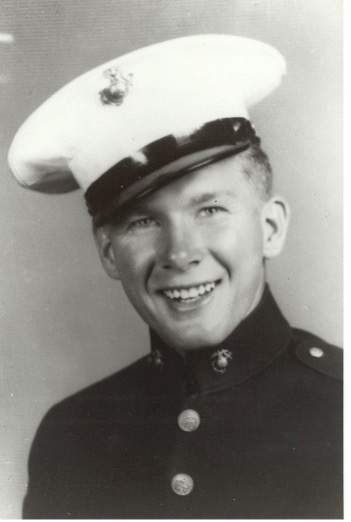
Rank at Time of Action: Corporal
Service: U.S. Marine Corps Reserve
Birthday: December 12, 1924
Birthplace: Ada, Minnesota
Unit: 1st Battalion, 1st Marines, 1st Marine Division
Date of Action: May 14, 1945
Awarded Medal of Honor: June 14, 1946
Medal of Honor Citation: For conspicuous gallantry and intrepidity at the risk of his life above and beyond the call of duty as leader of a machinegun squad serving with Company C, 1st Battalion, 1st Marines, 1st Marine Division, in action against enemy Japanese forces on Okinawa Shima in the Ryukyu Chain on 14 May 1945. Alert and aggressive during a determined assault against a strongly fortified Japanese hill position, Cpl. Hauge boldly took the initiative when his company’s left flank was pinned down under a heavy machinegun and mortar barrage with resultant severe casualties and, quickly locating the 2 machineguns which were delivering the uninterrupted stream of enfilade fire, ordered his squad to maintain a covering barrage as he rushed across an exposed area toward the furiously blazing enemy weapons. Although painfully wounded as he charged the first machinegun, he launched a vigorous single-handed grenade attack, destroyed the entire hostile gun position and moved relentlessly forward toward the other emplacement despite his wounds and the increasingly heavy Japanese fire. Undaunted by the savage opposition, he again hurled his deadly grenades with unerring aim and succeeded in demolishing the second enemy gun before he fell under the slashing fury of Japanese sniper fire. By his ready grasp of the critical situation and his heroic 1-man assault tactics, Cpl. Hauge had eliminated 2 strategically placed enemy weapons, thereby releasing the besieged troops from an overwhelming volume of hostile fire and enabling his company to advance. His indomitable fighting spirit and decisive valor in the face of almost certain death reflect the highest credit upon Cpl. Hauge and the U.S. Naval Service. He gallantly gave his life in the service of his country.
Elbert L. Kinser

Rank at Time of Action: Sergeant
Service: U.S. Marine Corps Reserve
Birthday: October 10, 1921
Birthplace: Greeneville, Tennessee
Unit: 3rd Battalion, 1st Marines, 1st Marine Division
Date of Action: May 4, 1945
Awarded Medal of Honor: July 4, 1946
Medal of Honor Citation: For conspicuous gallantry and intrepidity at the risk of his life above and beyond the call of duty while acting as leader of a Rifle Platoon, serving with Company I, 3d Battalion, 1st Marines, 1st Marine Division, in action against Japanese forces on Okinawa Shima in the Ryukyu Chain, 4 May 1945. Taken under sudden, close attack by hostile troops entrenched on the reverse slope while moving up a strategic ridge along which his platoon was holding newly won positions, Sgt. Kinser engaged the enemy in a fierce hand grenade battle. Quick to act when a Japanese grenade landed in the immediate vicinity, Sgt. Kinser unhesitatingly threw himself on the deadly missile, absorbing the full charge of the shattering explosion in his own body and thereby protecting his men from serious injury and possible death. Stouthearted and indomitable, he had yielded his own chance of survival that his comrades might live to carry on the relentless battle against a fanatic enemy. His courage, cool decision and valiant spirit of self-sacrifice in the face of certain death sustained and enhanced the highest traditions of the U.S. Naval Service. He gallantly gave his life for his country.
Fred F. Lester

Rank at Time of Action: Hospital Apprentice First Class
Service: U.S. Navy
Birthday: April 29, 1926
Birthplace: Downers Grove, Illinois
Unit: 1st Battalion, 22nd Marines, 6th Marine Division
Date of Action: May 30, 1945
Medal of Honor Citation: For conspicuous gallantry and intrepidity at the risk of his life above and beyond the call of duty while serving as a Medical Corpsman with an Assault Rifle Platoon, attached to the 1st Battalion, 22d Marines, 6th Marine Division, during action against enemy Japanese forces on Okinawa Shima in the Ryukyu Chain, 8 June 1945. Quick to spot a wounded marine Iying in an open field beyond the front lines following the relentless assault against a strategic Japanese hill position, Lester unhesitatingly crawled toward the casualty under a concentrated barrage from hostile machineguns, rifles, and grenades. Torn by enemy rifle bullets as he inched forward, he stoically disregarded the mounting fury of Japanese fire and his own pain to pull the wounded man toward a covered position. Struck by enemy fire a second time before he reached cover, he exerted tremendous effort and succeeded in pulling his comrade to safety where, too seriously wounded himself to administer aid, he instructed 2 of his squad in proper medical treatment of the rescued marine. Realizing that his own wounds were fatal, he staunchly refused medical attention for himself and, gathering his fast-waning strength with calm determination, coolly and expertly directed his men in the treatment of 2 other wounded marines, succumbing shortly thereafter. Completely selfless in his concern for the welfare of his fighting comrades, Lester, by his indomitable spirit, outstanding valor, and competent direction of others, had saved the life of 1 who otherwise must have perished and had contributed to the safety of countless others. Lester’s fortitude in the face of certain death sustains and enhances the highest traditions of the U.S. Naval Service. He gallantly gave his life for his country.
Martin O. May

Rank at Time of Action: Private First Class
Service: U.S. Army
Birthday: April 18, 1922
Birthplace: Phillipsburg, New Jersey
Unit: 307th Infantry, 77th Infantry Division
Date of Action: April 19 – 21, 1945
Awarded Medal of Honor: January 25, 1946
Medal of Honor Citation: He gallantly maintained a 3-day stand in the face of terrible odds when American troops fought for possession of the rugged slopes of legusuku-Yama on Ie Shima, Ryukyu Islands. After placing his heavy machinegun in an advantageous yet vulnerable position on a ridge to support riflemen, mortar and small arms fire from counterattacking Japanese. He repulsed this assault by sweeping the enemy with accurate bursts while explosions and ricocheting bullets threw blinding dust and dirt about him. He broke up a second counterattack by hurling grenades into the midst of the enemy forces, and then refused to withdraw, volunteering to maintain his post and cover the movement of American riflemen as they reorganized to meet any further hostile action. The major effort of the enemy did not develop until the morning of 21 April. It found Pfc. May still supporting the rifle company in the face of devastating rifle, machinegun, and mortar fire. While many of the friendly troops about him became casualties, he continued to fire his machinegun until he was severely wounded and his gun rendered useless by the burst of a mortar shell. Refusing to withdraw from the violent action, he blasted fanatical Japanese troops with hand grenades until wounded again, this time mortally. By his intrepidity and the extreme tenacity with which he held firm until death against overwhelming force of Japanese, was largely responsible for maintaining the American lines, and inspired his comrades to efforts which later resulted in complete victory and seizure of the mountain stronghold.
Robert M. McTureous Jr.
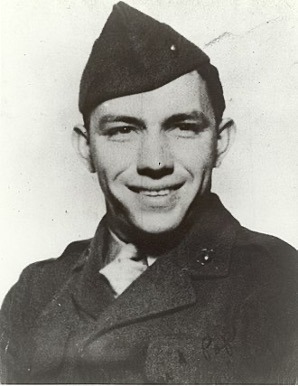
Rank at Time of Action: Private
Service: U.S. Marine Corps
Birthday: March 26, 1924
Birthplace: Altoona, Florida
Unit: 3rd Battalion, 29th Marines, 6th Marine Division
Date of Action: June 7, 1945
Awarded Medal of Honor: August 7, 1946
Medal of Honor Citation: For conspicuous gallantry and intrepidity at the risk of his life above and beyond the call of duty, while serving with the 3d Battalion, 29th Marines, 6th Marine Division, during action against enemy Japanese forces on Okinawa in the Ryukyu Chain, 7 June 1945. Alert and ready for any hostile counteraction following his company’s seizure of an important hill objective, Pvt. McTureous was quick to observe the plight of company stretcher bearers who were suddenly assailed by slashing machinegun fire as they attempted to evacuate wounded at the rear of the newly won position. Determined to prevent further casualties, he quickly filled his jacket with hand grenades and charged the enemy-occupied caves from which the concentrated barrage was emanating. Coolly disregarding all personal danger as he waged his furious 1-man assault, he smashed grenades into the cave entrances, thereby diverting the heaviest fire from the stretcher bearers to his own person and, resolutely returning to his own lines under a blanketing hail of rifle and machinegun fire to replenish his supply of grenades, dauntlessly continued his systematic reduction of Japanese strength until he himself sustained serious wounds after silencing a large number of the hostile guns. Aware of his own critical condition and unwilling to further endanger the lives of his comrades, he stoically crawled a distance of 200 yards to a sheltered position within friendly lines before calling for aid. By his fearless initiative and bold tactics, Pvt. McTureous had succeeded in neutralizing the enemy fire, killing 6 Japanese troops and effectively disorganizing the remainder of the savagely defending garrison. His outstanding valor and heroic spirit of self-sacrifice during a critical stage of operations reflect the highest credit upon himself and the U.S. Naval Service.
John W. Meagher
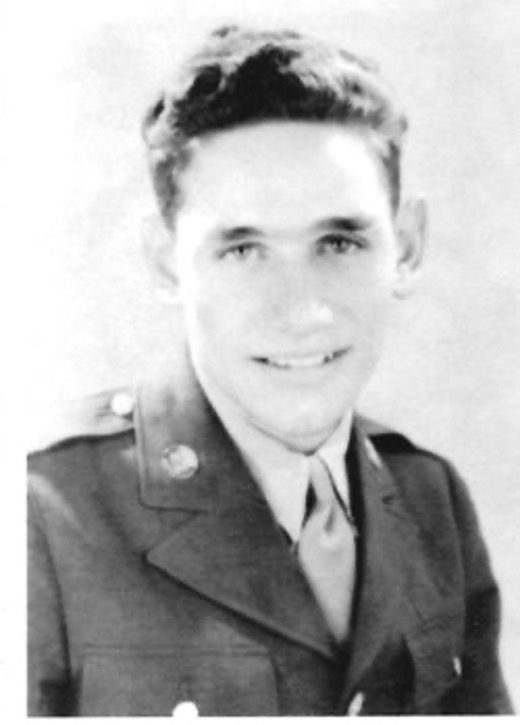
Rank at Time of Action: Technical Sergeant
Service: U.S. Army
Birthday: December 5, 1917
Birthplace: Jersey City, New Jersey
Unit: 2nd Battalion, 305th Infantry, 77th Infantry Division
Date of Action: June 19, 1945
Awarded Medal of Honor: June 14, 1946
Medal of Honor Citation: He displayed conspicuous gallantry and intrepidity above and beyond the call of duty. In the heat of the fight, he mounted an assault tank, and, with bullets splattering about him, designated targets to the gunner. Seeing an enemy soldier carrying an explosive charge dash for the tank treads, he shouted fire orders to the gunner, leaped from the tank, and bayoneted the charging soldier. Knocked unconscious and his rifle destroyed, he regained consciousness, secured a machinegun from the tank, and began a furious 1-man assault on the enemy. Firing from his hip, moving through vicious crossfire that ripped through his clothing, he charged the nearest pillbox, killing 6. Going on amid the hail of bullets and grenades, he dashed for a second enemy gun, running out of ammunition just as he reached the position. He grasped his empty gun by the barrel and in a violent onslaught killed the crew. By his fearless assaults T/Sgt. Meagher single-handedly broke the enemy resistance, enabling his platoon to take its objective and continue the advance.
Edward J. Moskala
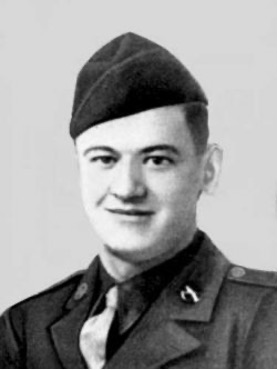
Rank at Time of Action: Private First Class
Service: U.S. Army
Birthday: November 11, 1921
Birthplace: Chicago, Illinois
Unit: 383rd Infantry, 96th Infantry Division
Date of Action: April 9, 1945
Awarded Medal of Honor: February 26, 1946
Medal of Honor Citation: He was the leading element when grenade explosions and concentrated machinegun and mortar fire halted the unit’s attack on Kakazu Ridge, Okinawa, Ryukyu Islands. With utter disregard for his personal safety, he charged 40 yards through withering, grazing fire and wiped out 2 machinegun nests with well-aimed grenades and deadly accurate fire from his automatic rifle. When strong counterattacks and fierce enemy resistance from other positions forced his company to withdraw, he voluntarily remained behind with 8 others to cover the maneuver. Fighting from a critically dangerous position for 3 hours, he killed more than 25 Japanese before following his surviving companions through screening smoke down the face of the ridge to a gorge where it was discovered that one of the group had been left behind, wounded. Unhesitatingly, Pvt. Moskala climbed the bullet-swept slope to assist in the rescue, and, returning to lower ground, volunteered to protect other wounded while the bulk of the troops quickly took up more favorable positions. He had saved another casualty and killed 4 enemy infiltrators when he was struck and mortally wounded himself while aiding still another disabled soldier. With gallant initiative, unfaltering courage, and heroic determination to destroy the enemy, Pvt. Moskala gave his life in his complete devotion to his company’s mission and his comrades’ well-being. His intrepid conduct provided a lasting inspiration for those with whom he served.
Joseph E. Muller
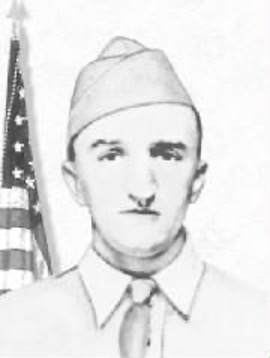
Rank at Time of Action: Sergeant
Service: U.S. Army
Birthday: June 23, 1908
Birthplace: Holyoke, Massachusetts
Unit: 305th Infantry, 96th Infantry Division
Date of Action: May 15 – 16, 1945
Awarded Medal of Honor: July 17, 1946
Medal of Honor Citation: He displayed conspicuous gallantry and intrepidity above and beyond the call of duty. When his platoon was stopped by deadly fire from a strongly defended ridge, he directed men to points where they could cover his attack. Then through the vicious machinegun and automatic fire, crawling forward alone, he suddenly jumped up, hurled his grenades, charged the enemy, and drove them into the open where his squad shot them down. Seeing enemy survivors about to man a machinegun, He fired his rifle at point-blank range, hurled himself upon them, and killed the remaining 4. Before dawn the next day, the enemy counterattacked fiercely to retake the position. Sgt. Muller crawled forward through the flying bullets and explosives, then leaping to his feet, hurling grenades and firing his rifle, he charged the Japs and routed them. As he moved into his foxhole shared with 2 other men, a lone enemy, who had been feigning death, threw a grenade. Quickly seeing the danger to his companions, Sgt. Muller threw himself over it and smothered the blast with his body. Heroically sacrificing his life to save his comrades, he upheld the highest traditions of the military service.
Alejandro R. Ruiz
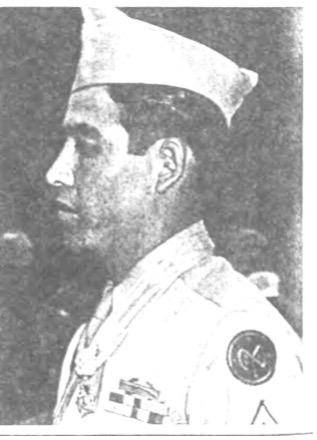
Rank at Time of Action: Private First Class
Service: U.S. Army
Birthday: April 26, 1924
Birthplace: Loving, New Mexico
Unit: 1st Battalion, 165th Infantry, 27th Infantry Division
Date of Action: April 28, 1945
Awarded Medal of Honor: June 14, 1946
Medal of Honor Citation: When his unit was stopped by a skillfully camouflaged enemy pillbox, he displayed conspicuous gallantry and intrepidity above and beyond the call of duty. His squad, suddenly brought under a hail of machinegun fire and a vicious grenade attack, was pinned down. Jumping to his feet, Pfc. Ruiz seized an automatic rifle and lunged through the flying grenades and rifle and automatic fire for the top of the emplacement. When an enemy soldier charged him, his rifle jammed. Undaunted, Pfc. Ruiz whirled on his assailant and clubbed him down. Then he ran back through bullets and grenades, seized more ammunition and another automatic rifle, and again made for the pillbox. Enemy fire now was concentrated on him, but he charged on, miraculously reaching the position, and in plain view he climbed to the top. Leaping from 1 opening to another, he sent burst after burst into the pillbox, killing 12 of the enemy and completely destroying the position. Pfc. Ruiz’s heroic conduct, in the face of overwhelming odds, saved the lives of many comrades and eliminated an obstacle that long would have checked his unit’s advance.
Albert E. Schwab
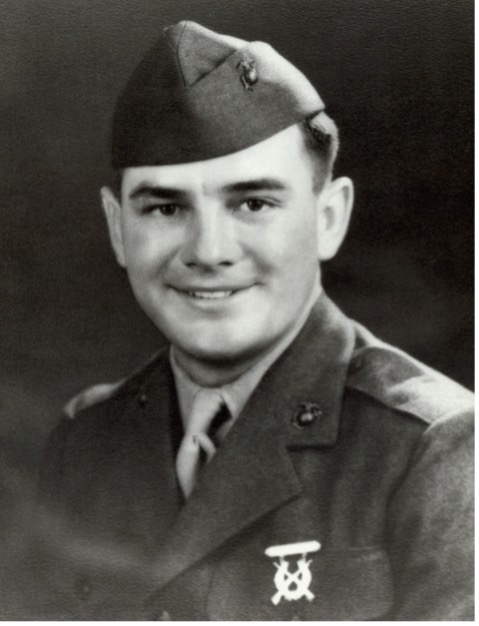
Rank at Time of Action: Private First Class
Service: U.S. Marine Corps Reserve
Birthday: July 17, 1920
Birthplace: Washington, D.C.
Unit: 1st Battalion, 5th Marines, 1st Marine Division
Date of Action: May 7, 1945
Awarded Medal of Honor: May 31, 1946
Medal of Honor Citation: For conspicuous gallantry and intrepidity at the risk of his life above and beyond the call of duty as a flamethrower operator in action against enemy Japanese forces on Okinawa Shima in the Rykuyu Islands, 7 May 1945. Quick to take action when his company was pinned down in a valley and suffered resultant heavy casualties under blanketing machinegun fire emanating from a high ridge to the front, Pfc. Schwab, unable to flank the enemy emplacement because of steep cliffs on either side, advanced up the face of the ridge in bold defiance of the intense barrage and, skillfully directing the fire of his flamethrower, quickly demolished the hostile gun position, thereby enabling his company to occupy the ridge. Suddenly a second enemy machinegun opened fire, killing and wounding several marines with its initial bursts. Estimating with split-second decision the tactical difficulties confronting his comrades, Pfc. Schwab elected to continue his l-man assault despite a diminished supply of fuel for his flamethrower. Cool and indomitable, he moved forward in the face of a direct concentration of hostile fire, relentlessly closed the enemy position and attacked. Although severely wounded by a final vicious blast from the enemy weapon, Pfc. Schwab had succeeded in destroying 2 highly strategic Japanese gun positions during a critical stage of the operation and, by his dauntless, single-handed efforts, had materially furthered the advance of his company. His aggressive initiative, outstanding valor and professional skill throughout the bitter conflict sustain and enhance the highest traditions of the U.S. Naval Service.
Seymour W. Terry
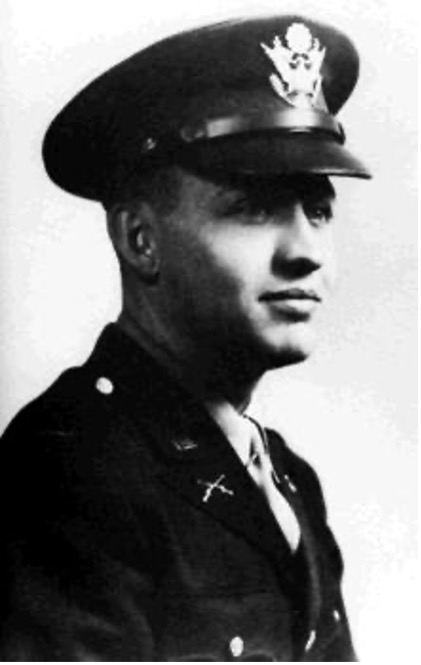
Rank at Time of Action: First Lieutenant
Service: U.S. Army
Birthday: December 11, 1918
Birthplace: Little Rock, Arkansas
Unit: 382nd Infantry, 96th Infantry Division
Date of Action: May 11, 1945
Awarded Medal of Honor: March 6, 1946
Medal of Honor Citation: 1st Lt. Terry was leading an attack against heavily defended Zebra Hill when devastating fire from 5 pillboxes halted the advance. He braved the hail of bullets to secure satchel charges and white phosphorus grenades, and then ran 30 yards directly at the enemy with an ignited charge to the first stronghold, demolished it, and moved on to the other pillboxes, bombarding them with his grenades and calmly cutting down their defenders with rifle fire as they attempted to escape. When he had finished this job by sealing the 4 pillboxes with explosives, he had killed 20 Japanese and destroyed 3 machineguns. The advance was again held up by an intense grenade barrage which inflicted several casualties. Locating the source of enemy fire in trenches on the reverse slope of the hill, 1st Lt. Terry, burdened by 6 satchel charges launched a l-man assault. He wrecked the enemy’s defenses by throwing explosives into their positions and himself accounted for 10 of the 20 hostile troops killed when his men overran the area. Pressing forward again toward a nearby ridge, his 2 assault platoons were stopped by slashing machinegun and mortar fire. He fearlessly ran across 100 yards of fire-swept terrain to join the support platoon and urge it on in a flanking maneuver. This thrust, too, was halted by stubborn resistance. 1st Lt. Terry began another 1 -man drive, hurling grenades upon the strongly entrenched defenders until they fled in confusion, leaving 5 dead behind them. Inspired by this bold action, the support platoon charged the retreating enemy and annihilated them. Soon afterward, while organizing his company to repulse a possible counterattack, the gallant company commander was mortally wounded by the burst of an enemy mortar shell. By his indomitable fighting spirit, brilliant leadership, and unwavering courage in the face of tremendous odds, 1st Lt. Terry made possible the accomplishment of his unit’s mission and set an example of heroism in keeping with the highest traditions of the military service.
